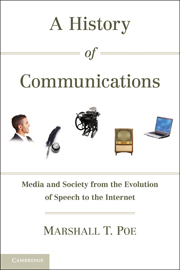Introduction - Media Causes and Media Effects
Published online by Cambridge University Press: 05 June 2012
Summary
The premises with which we begin are not arbitrary ones, not dogmas, but real premises from which abstraction can only be made in the imagination. They are the real individuals, their activity and the material circumstances in which they live, both those which they find and those produced by their activity. These premises can thus be verified in a purely empirical way.
– Karl Marx, The German Ideology, 1845In 1846, Karl Marx surveyed the philosophical scene in Germany. He was not happy with what he saw. The thinkers of his day, he complained, had mistaken speculative philosophy for hard science. They loved to play with ideas, but they never quite got around to testing them in the real world. The result was a thick bramble of vague concepts, imprecise notions, and fuzzy impressions that, while perhaps entertaining, never really added up to a concrete theory of anything. Marx thought these philosophers were doing their countrymen a disservice. Things were changing rapidly, and people needed to understand why. He therefore set about trying to explain these ongoing changes by means of a rigorous, empirically testable theory of history.
A similar situation obtains today in communications studies. The most influential thinkers in the field are, like the philosophers of Marx's day, a bit too fond of high-flown ideas and not fond enough of the solid facts. They propose theories that are at once hard to understand, difficult to test, and sometimes just plain wrong. These deficiencies are unfortunate because, as in Marx's era, things are changing rapidly. In the last quarter century, we have witnessed a rare event in human history: the birth of a new medium, the Internet. Although pundits tend to exaggerate its impact, it is certain that that impact is significant. The Internet has changed the way we work, what we consume, how we play, whom we interact with, how we find things out, and myriad other details about the way we live. Yet we don't have a good way to understand where the Internet came from and what it is doing to us, so we are to some degree adrift.
- Type
- Chapter
- Information
- A History of CommunicationsMedia and Society from the Evolution of Speech to the Internet, pp. 1 - 25Publisher: Cambridge University PressPrint publication year: 2010



